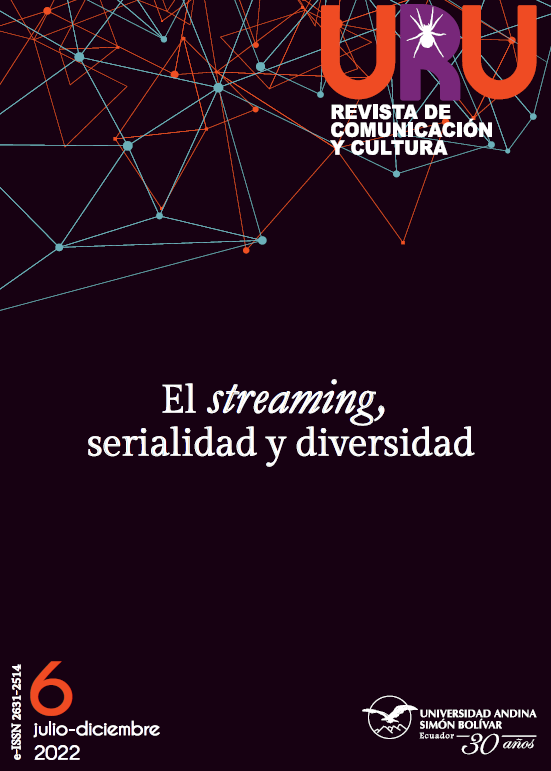Dark: Apuntes de la filosofía y la ciencia ficción sobre el viaje en el tiempo
DOI:
https://doi.org/10.32719/26312514.2022.6.4Keywords:
Dark, Netflix, science fiction, time travelAbstract
Dark is a German series created by Baran bo Odar and Jantje Friese and produced by the Netflix digital platform. Released in 2017, throughout its three seasons, the series presents a plot that revolves around the concept of time travel, from a philosophical - fantastic perspective. In this work, it is analyzed how some philosophical conceptions of time influence Dark, especially that of circular time, or eternal return, raised by Friedrich Nietzsche in his works The Gay Science (1882) and Thus Spoke Zarathustra (1883). In another line, certain scientific postulates serve as the foundation for the development of the plot, such as Novikov’s Principle of self-consistency (1983), the paradoxes of time travel or the wormhole approach, according to the works by Einstein and Rosen (1935). In conclusion, the German production Dark offers a modern approximation of the possibility of time travel, compared to other audiovisual or cultural products that deal with the same topic, based on both philosophy and real and recent scientific theories, which contributes to the consolidation of an audiovisual product with a serious and solid premise, within the field of science fiction, through the execution of an argument that delves into concepts such as free will, predestination, the conception of time and the idea of time as influencing dimension in our behavior.
Downloads
References
Aristóteles. 1995. Física. Traducido por Guillermo de Echandía. Madrid: Gredos.
Camargo, Marcos de, y Stamberg da Silva. 2020. “O nó(s) que nunca desata: O fio de Ariadne e o labirinto do autoconhecimento em ‘Dark’”. Comunicação e Informação 25: 1-25.
Einstein, Albert. 2001 [1916] Relativity: The Special and General Theory. Mineola (NY), US: Dover Publications.
Guinard, Patrice. 2003. “El tiempo de los filósofos: De Platón a Nietzsche, y de Nietzsche a Platón”. Centre Universitaire de Recherche en Astrologie.
Hesles, Germán. 2013. “El viaje en el tiempo en la literatura de ciencia ficción española”. Tesis doctoral, Universidad Complutense de Madrid, España.
Isea, Roberto. 2016. “La física de los viajes en el tiempo a través de un agujero de gusano”. Revista de la Escuela de Física, UNAH 4 (1): 9-19. DOI: https://doi.org/10.5377/ref.v4i1.8309
Isler, Carlos. 2008. “El tiempo en las ‘Confesiones’ de san Agustín”. Revista de Humanidades 17-18: 187-200.
Navarro, Ernesto. 2006. “El tiempo a través del tiempo”. Athenea Digital. Revista de Pensamiento e Investigación Social 9: 1-18. DOI: https://doi.org/10.5565/rev/athenead/v1n9.257
Nietzsche, Friedrich. 2002. La gaya ciencia. Madrid: Edaf.
Nietzsche, Friedrich. 2011. Así habló Zaratustra. Madrid: Alianza Editorial.
Nóvikov, Igor. 1983. Evolution of the Universe. Cambridge, UK: Cambridge University Press.
Paladines, Lenin. 2019. “El eterno retorno: Análisis de la concepción temporal en la serie ‘Dark’ de Netflix”.PAAKAT. Revista de Tecnología y Sociedad 9 (16). http://dx.doi.org/10.32870/Pk.a9n16.382. DOI: https://doi.org/10.32870/Pk.a9n16.382
Redondo, Jesús. 2020. “Explicacio?n y a?rbol genealo?gico de todos los personajes de Dark – Temporada 1 y 2”. Espectadores.net. 14 de julio.
Schrödinger, Erwin. 1935. “Die gegenwärtige Situation in der Quantenmechanik”. Naturwissenschaften 23 (48): 807-12. https://doi.org/10.1007/BF01491891. DOI: https://doi.org/10.1007/BF01491891
Tegmark, Max. 2007. “The Mathematical Universe”. Foundations of Physics 38: 101-50. DOI: https://doi.org/10.1007/s10701-007-9186-9
Wells, Herbert George. 1994 [1895]. La máquina del tiempo. Madrid: Altaya.
Downloads
Published
How to Cite
Issue
Section
License

This work is licensed under a Creative Commons Attribution-NonCommercial-ShareAlike 4.0 International License.
ASSIGNMENT OF RIGHTS, DECLARATION OF CONFLICT OF INTEREST AND DISSEMINATION
The authors who publish in this journal accept the following conditions:
- Authors retain copyright and grant the journal the right of first publication, with the work registered under the Creative Commons Attribution-NonCommercial-ShareAlike 4.0 License, which allows sharing, adapting and attributing the work (see: Open Access Policies).
- Authors can make other independent and additional contractual agreements for the distribution of the article published in this journal (e.g., include it in an institutional repository or publish it in a book) as long as they expressly indicate that the article was published for the first time in Uru: Revista de Comunicación y Cultura. In the case of reproduction, a note similar to the following must be included: This text was originally published in the journal Uru: Revista de Comunicación y Cultura N ° -, year of publication.
- Authors are encouraged to publish their work on the Internet (e.g. on institutional or personal pages) in the final version published by Uru: Revista de Comunicaicón y Cultura as it may lead to a wider and faster dissemination of the published work.








